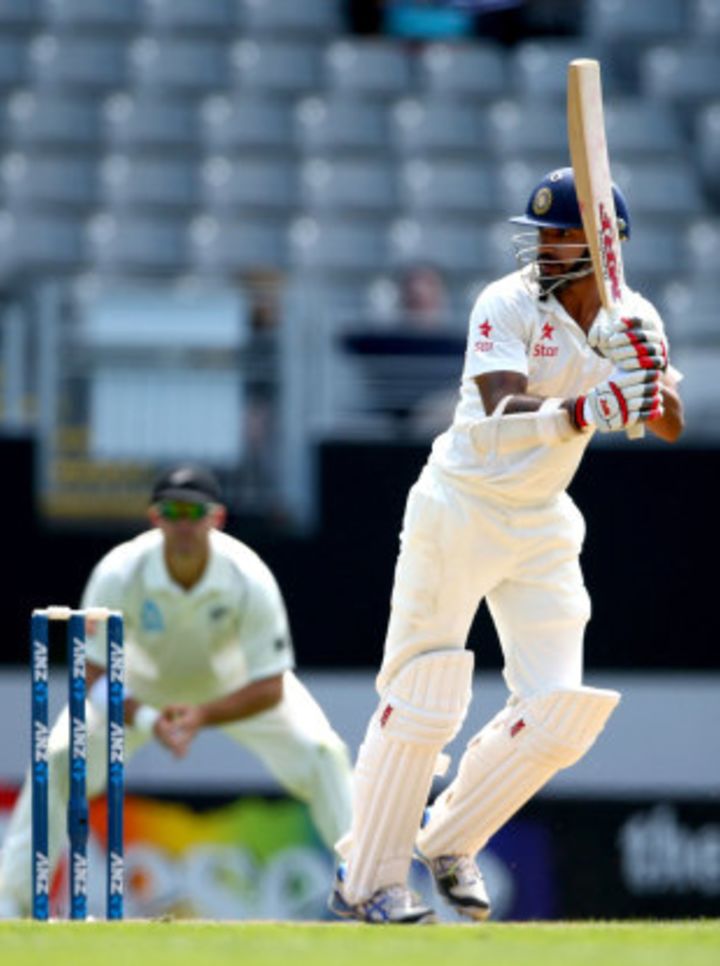India's batsmen proving to be fast learners
In spite of their inexperience, India's young batsmen are displaying a capability to adapt and cope with tough situations, as the Tests in Johannesburg and Auckland have shown

India made 366 in their second innings in Auckland. It was only the seventh time they had made more than 350 in the fourth innings of a Test outside India. The last time was at Lord's in 2002, helped by a surprising century from No 8 Ajit Agarkar. Before 2002, it was in 1979 at The Oval. Which means that in the time Rahul Dravid, Sachin Tendulkar, Sourav Ganguly and VVS Laxman were part of the side, India needed an Agarkar hundred to make more than 350 in the last innings of an away Test.
The four batsmen came together in 1996, and three of them were in the team until the Australia tour of 2012. In that period, India were set 350-plus to win 18 times away from home. They didn't win a single game, and drew six. The first time they were handed such a target in that duration, by South Africa in Durban in 1996, they crashed to 66 all out in 34.1 overs. The second time, in Cape Town, they managed 144.
This is in no way to belittle the efforts of the previous generation, but the statistics illustrate how difficult it is to score so many runs batting last in a Test, something even batsmen of the caliber of the four former Indian batsmen could not do. The efforts from the South African tour of 1996-97 also show how collectively fallible the batsmen, now considered great, were in their early days.
Perhaps the numbers will also help us appreciate what the current set of young Indian batsmen did in Auckland. Not only did they come back from a poor first innings, they crucially told us that the promise they had shown in South Africa a few weeks back could be built upon.
In part because of the deeds of the batsmen preceding them, the current lot will be measured against high standards. Indian cricket has also entered an age where the expectations from fans are generally elevated. But instead of looking at their failure to break the run of 13 overseas Tests without a win, they should be afforded considerable leeway based on their potential, which has been abundantly on display on their first two tours together, especially in Johannesburg and Auckland.
India's top six batsmen have a collective experience of 77 Tests. MS Dhoni alone has played 82. At both Wanderers and Eden Park, first visits to the countries for most of them, they came back from an average first-innings performance. Both times, there were hundreds from the top-order and support from the middle-order.
Also building upon the promise is the exposure they have got on these early tours. The Wanderers match will go down in history as one of the most thrilling draws. The Auckland one was a rollercoaster over days three and four - to concede 503, then get bowled out for 202, then come back to roll over the opposition for 105 and finally, bat so well that at one stage, you had a good chance of chasing down 400-plus, something that has been done only four times ever before.
The current Indian batsmen are on a steep learning curve, and they are not sliding down the slope at the moment.
The current Indian batsmen are on a steep learning curve, and they are not sliding down the slope at the moment. In years to come, the learning will hopefully show. They might in time develop enough to start setting up matches overseas with big totals, as the earlier set did often. India may or may not have the bowling resources to utilise the pressure these totals create, but for now, it is assuring for the side to know that they have a group of batsmen who are picking up things fast. After the Auckland Test was lost by 40 runs, Dhoni hoped his batsmen had come out having absorbed the importance of driving home the advantage when they could. India were 222 for 2, when Virat Kohli threw his bat at a short and wide one to end a century partnership and allow New Zealand back into the game.
"Capitalise. It is a very easy thing to say in one word but a lot of thinking and experience goes behind it. They must be learning out of it," Dhoni said. "Games like these, even if you play one game, it gives you the experience of three-four Test matches, where you start respecting. You start looking ahead into the game. It is a game that goes on for five days, so you start thinking, if we get this partnership going, what needs to be done at the end of the third day maybe.
"Of course, you need to break it down and take it session by session. But it is also important to look ahead as to what needs to be done, what will happen to the wicket, whether it will dry down, whether it will assist the spinners or not. These are the kind of learnings you get out of these games. Hopefully there will be plenty in our dressing room who must have learned a lot out of it."
Wellington might turn out to be better or worse than Durban was. However, there will be no taking away from the potential of Johannesburg and Auckland.
Abhishek Purohit is a sub-editor at ESPNcricinfo
Read in App
Elevate your reading experience on ESPNcricinfo App.